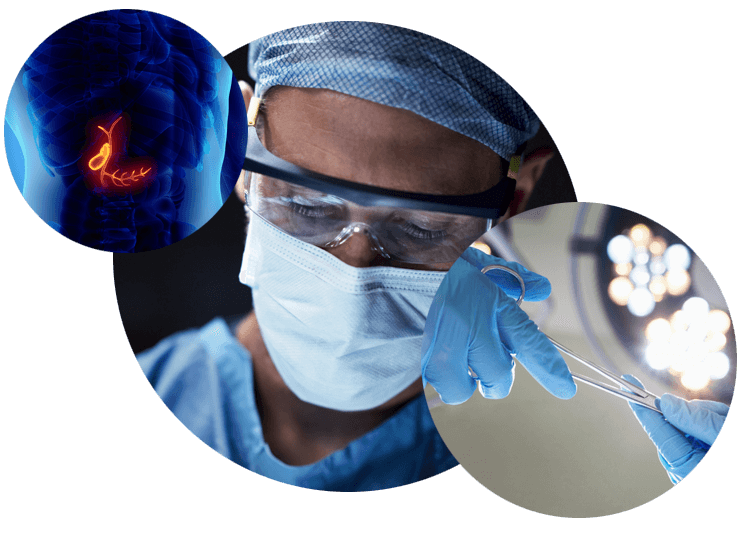Gallstone Surgery
Depending on your condition, your surgeon might remove your entire gallbladder (known as a cholecystectomy) or remove the gallstones from the bile ducts if cholecystectomy has previously been performed.
How is Gallstone Surgery Performed?
Gallstone surgery becomes necessary when gallstones (small, hard lumps formed out of bile pigment, cholesterol and salts) block the gall blabber or bile ducts. Gallstones can cause symptoms of abdominal and back pain, pain after eating a fatty meal, jaundice and fever.
Depending on your condition, your surgeon might remove your entire gallbladder (known as a cholecystectomy) or remove the gallstones from the bile ducts if cholecystectomy has previously been performed.
- You will have a general anaesthetic.
- During a key hole procedure, the surgeon makes several small incisions in the abdomen.
- A tube is inserted to inflate the area with carbon dioxide, allowing the surgeon to see more clearly.
- The surgeon inserts a laparoscope (a thin tube with a tiny camera and light attached) into one of the incisions and the image appears on a screen.
- The surgeon may check for gallstones in the bile ducts using a special x-ray known as a cholangiogram.
- Permanent clips tie off the artery and bile ducts that service the gallbladder.
- The gallbladder is detached using electrocautery and is removed through one of the incisions.
- The instruments are removed and the wound is sutured and dressed.
Sometimes open gallbladder surgery is necessary if there is scar tissue, inflammation, bleeding or injury and a laparoscopic procedure is not possible. The surgeon performs the procedure through an additional single large incision across the abdomen.
What to Expect After Gallstone Surgery?
- If you have had a laparoscopic procedure, you can expect an overnight hospital stay.
- If you have had open surgery, your hospital stay may be up to eight days.
- You might experience discomfort in your shoulder from the gas.
- You will be encouraged to walk around to regain your strength and cough regularly to clear your lungs after the anaesthetic.
- You will be offered pain relief.
- You will need to rest as much as possible for up to five days.
- You should avoid heavy lifting during your recovery period.
- Your digestion and toilet habits may change temporarily, up to a few weeks with fatty meal. You will be advised to stay on low fat diet.
Possible Complications
Complications of gallstone surgery are rare but include:
- Injury to digestive organs, blood vessels or the bile duct.
- Bile leaking into the abdominal cavity.
- Internal bleeding.
Some rare complications may require further surgery.

